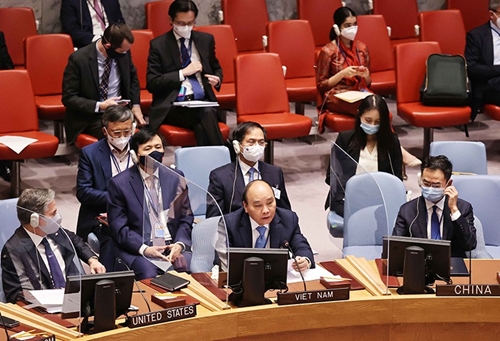“Mr. President,
It is my honor to come to this Chamber to attend this Security Council Open Debate on climate security - a topic of strategic importance and immense relevance to our time.
I thank the Secretary General and other briefers for your insightful inputs and recommendations.
    |
 |
|
President Nguyen Xuan Phuc (first row, center) speaking at the event |
Mr. President,
Climate change represents the greatest global challenge of our time, and is shaping the future of mankind. The devastating impacts of climate change remain evident in every continent. Sea level rise threatens to submerge Pacific island states. Severe droughts persist in West Africa and the Horn of Africa. Floods and natural disasters are predominant in Southeast Asia. I must also mention the degradation of biodiversity in South America and the abnormal melting of Antarctic ice caps. Climate change is taking up valuable resources meant for socio-economic development, and worsening poverty, unemployment and social inequality.
We are also witnessing how climate change is igniting disputes over natural resources between populations. They are displacing tens of millions from their homes to seek new livelihood, and triggering trans-border security threats of ecology, environment, food and water resources.
These consequences may well erupt into geopolitical tension and instability, damaging peace, security, development and prosperity of states and nations. This is truly a “code red” and a war without gunfire, so to speak, that causes economic damage and losses in lives no less dire than actual wars and conflicts.
Against such backdrop, I wish to share with you three points that I think we should act vigorously:
First, the UNSC must uphold its leading role in establishing mechanisms for assessment, forecast and warning of climate security risks at the early stage and while they are still distant. This will help us proactively outline effective response strategies and measures. Conflict prevention, peace-keeping missions, and humanitarian assistance and post-conflict reconstruction efforts under the auspices of the UNSC must include climate security in a proper manner.
In this connection, I wish to propose that the U.N. should establish a comprehensive database system on multi-dimensional impacts of sea-level rise in support of global response policy formulation.
Second, the people's interest, especially that of vulnerable groups, needs to take center stage if we are to harmoniously address the inseparable relationship between security, development and humanitarian activities. Vietnam strongly supports the full implementation of Resolutions 2532 and 2573 of the UNSC in order to achieve a global ceasefire as early as possible, and protect civilians and critical infrastructure in areas of armed conflicts.
Third, we need to continue to safeguard the sovereignty, key role and resilience of nations in climate change mitigation and adaptation efforts. We also need to step up international cooperation to supplement and coordinate resources to effectively realize the 2030 SDGs, the Paris Agreement, and other key international treaties.
We must resolve to cut greenhouse emissions, in which developed countries should take the lead. Ample resources should also be set aside to provide developing countries with assistance in financing, technologies and know-how, so as to ensure that no country is left behind in the common fight against climate change.
Mr. President,
Vietnam is one of the countries hardest hit by climate change. Successive natural disasters have caused us great losses in life and property. The Mekong Delta, the heart of Vietnam's agricultural production, is witnessing a record episode of droughts and saline intrusion, jeopardizing the livelihood and everyday life of 20 million people, as well as food security of the entire country and region.
For this reason, to realize its aspiration and vision for national development, and perform its duty to the international community, Vietnam is determined and strongly committed to take climate action, and develop a green, sustainable and low-carbon economy as pledged at the COP 21.
Vietnam supports all efforts to respond to climate-related challenges at the UNSC, at multilateral forums, and at other cooperation arrangements at the bilateral and regional levels. We hope to continue to receive assistance in resources and policy advice from international friends so as to better fulfill our commitments.
I am convinced that through international commitment and solidarity, all countries will take bold actions towards greener and more sustainable for the future.
Thank you!”
Source: VNA